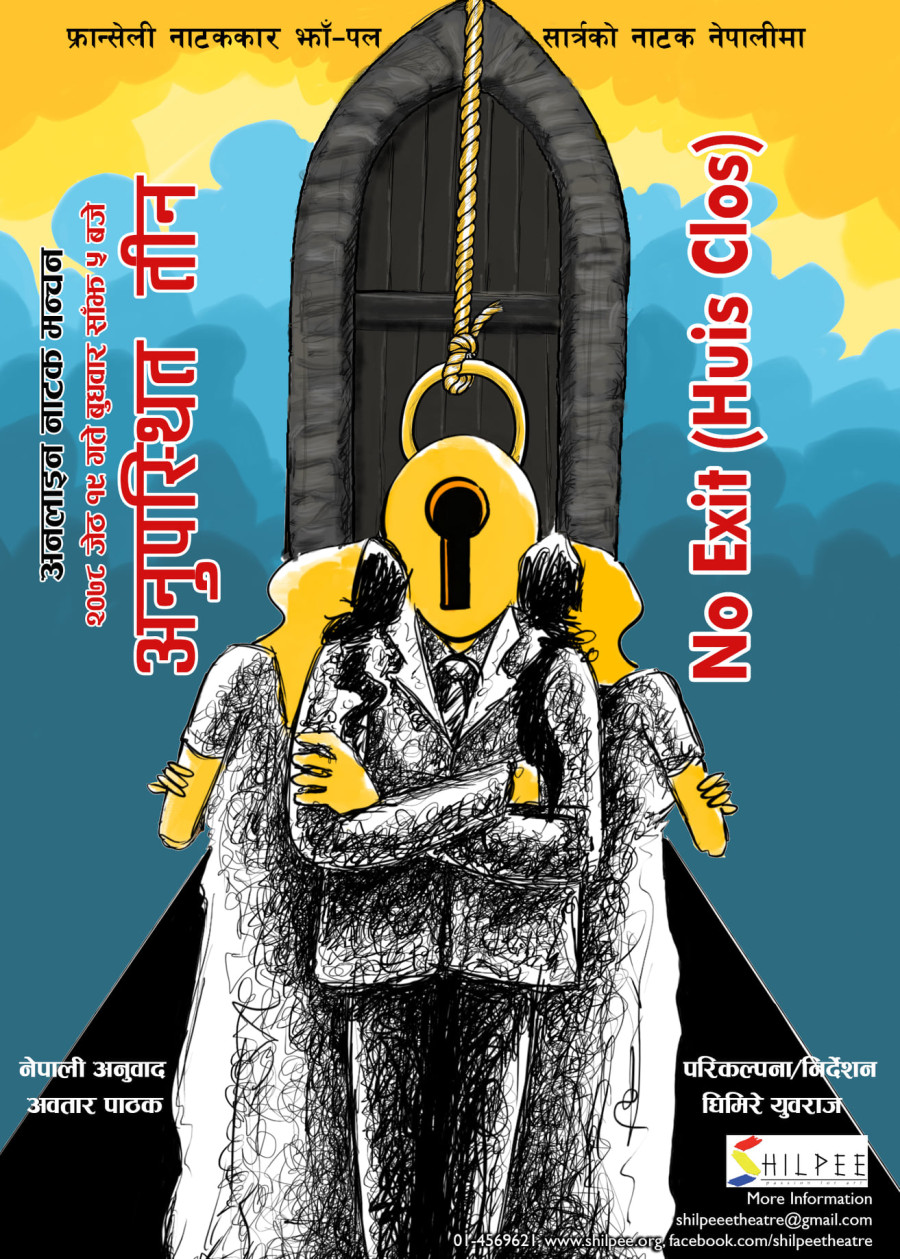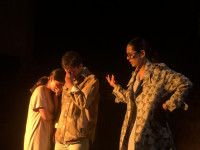Theater
The show must go on
Based on French philosopher and playwright Jean-Paul Sartre’s ‘No Exit,’ ‘Anupastit Teen’ by Shilpee Theatre is one of the first plays in Nepal to go virtual.
Ankit Khadgi
In his five years career as a theatre actor, Manang Lawoti has always rehearsed and performed on a stage.
But for the past one week, Lawoti has been acting and rehearsing in front of his laptop screen along with fellow theatre actors and gaining a completely new experience. The crew are readying for the upcoming virtual play ‘Anupastit Teen’.
“Acting in front of a laptop camera comes with its limitations. One cannot move freely because of the limited area a camera can cover. But yes, it is definitely a new experience that is helping me to grow as an actor,” says Lawoti, who plays the role of a manager in the play.
Based on ‘No Exit’, a one-act-play by French philosopher and playwright Jean-Paul Sartre, ‘Anupastit Teen’ by Shilpee Theatre will be broadcast on the theatre’s YouTube channel and Facebook page on June 2.
“It’s a play about identity conflict,” says Yubaraj Ghimire, the play’s director.
The play, which is translated into Nepali by Awatar Pathak, has four main characters. The play’s three main characters Ichhya (played by Usha Rajak), Azaad (played by Salil Subedi) and Abhilasha (played by Pabitra Khadka) are trapped in a room after their death. Managing the room is the character played by Lawoti.
Unaware of how the world is reacting to their death, the three protagonists spend time talking about their lives, confide secrets in each other, and as they try to run away from the truth, they find themselves dealing with existential crisis.
Ghimire, who is also the founder and the artistic director of the theatre group, says that the entire crew, from actors to musicians and technicians, will perform from their respective homes live in front of their laptop screens.
But broadcasting the play virtually wasn’t the original plan.
When the first wave of Covid-19 subsided and some semblance of normalcy appeared to be returning, Shilpee Theatre started planning to show the play in their venue, says Ghimire.
“We had been rehearsing for almost nine weeks and had even set up the stage. From sets to lights, everything was ready and we were all excited to be performing the play on a stage for a live audience,” says Ghimire.
But as the second wave of Covid-19 pandemic gripped the country, it became apparent that their plan was not going to materialise.
However, as days passed, they say that they felt that the show must go on—even if it meant performing the play virtually.
Hence a decision was made by all involved to experiment and perform the show online regardless of the inherent technical and artistic issues virtual platforms come with.
“The lockdown left us with very little choice,” says Ghimire. “Although we were aware of the challenges of performing online, we thought that uncertain times like these are an opportunity for us to experiment and switch to online platforms as there’s no certainty regarding when we can perform on stage in front of a live audience.”
For the past one week, the actors have been rehearsing for the play from their respective homes. Every day, they meet on Zoom or Google Meet and practise for hours using the available resources and talking and acting as if they are in the same physical space.
“The whole experience is very new to all of us. There are multiple challenges in rehearsing the way we are doing and at the same time there’s immense pressure to make sure that everything goes smoothly without any technical hiccups,” says Pabitra Khadka.
However, the makers and actors are aware that with a virtual play it is not possible to give the audience a viewing experience akin to theatre. They are also aware that their performance may not be as impactful as it otherwise would have been had they performed on a stage in front of a live audience.
Since the play’s story demands that the actors be in the same space, as they all are trapped in a room, the biggest challenge for them, they say, is to make sure that the audience gets the feeling that the actors are all together in one space.
Other challenges that could hinder in delivering as good of a performance as possible, they say, are unreliable internet connectivity and electricity, and space limitations.
But Ghimire says the team is doing everything it can to deliver the best performance for the audience to enjoy.
“Yes, the actors can’t be in the same space and perform, but we are using all the tricks to give the feeling that they are together. For instance, we are making sure that their background is the same. Similarly, we are also taking care of props so that all the actors have the identical ones that appear in the play, which will make it look more natural,” he says.
As for now, the play will be shown for one day. However there are possibilities that they will perform again, depending on the feedback they get from the audience, says Ghimire.
Theatres in Nepal are one of the first institutions forced to close due to the pandemic. So what kind of performance the Shilpee Theatres crew manages to deliver and how well the play gets received will definitely determine to some extent how Nepal’s theatre community moves ahead in a world gripped by a pandemic.
“As actors, most of us are strong yet delicate. Living in difficult times like these with no work has been very challenging,” says Usha Rajak. “Virtual play is one platform we have to continue doing what we are passionate about. This gives us a sense of hope and something to look forward to.”




 9.6°C Kathmandu
9.6°C Kathmandu










